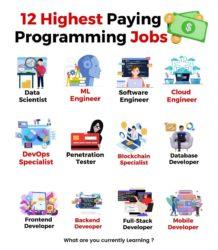Becoming a Blockchain Specialist: Navigating the Path to Expertise
In the era of digital transformation, blockchain technology has emerged as a groundbreaking force reshaping industries and processes. At the heart of this revolution are blockchain specialists, professionals equipped with the knowledge and skills to harness the power of distributed ledgers. In this article, we delve into what a blockchain specialist is and outline the journey to becoming one.
Unveiling the Role of a Blockchain Specialist:
A blockchain specialist is an expert who possesses a deep understanding of blockchain technology, its intricacies, applications, and implications. These specialists play a pivotal role in driving the adoption and implementation of blockchain solutions across industries. They collaborate with developers, business leaders, and stakeholders to design, develop, and deploy blockchain-based systems that enhance transparency, security, and efficiency.
A blockchain specialist is a professional who possesses an in-depth knowledge of blockchain technology, its underlying principles, and its real-world implications. These specialists are adept at designing, developing, implementing, and maintaining blockchain solutions that revolutionize processes, enhance security, and foster trust across various industries.
Key Responsibilities:
The job role of a blockchain specialist encompasses a diverse range of responsibilities, each contributing to the successful deployment and utilization of blockchain technology. Here are some of the key tasks associated with this role:
1. Solution Design:
Blockchain specialists collaborate with stakeholders to identify use cases where blockchain can add value. They analyze business requirements, processes, and pain points to design innovative blockchain-based solutions that streamline operations and increase transparency.
2. Development and Coding:
Blockchain specialists are often involved in the actual development of blockchain networks, smart contracts, and decentralized applications (DApps). They write code using programming languages like Solidity, C++, Python, or JavaScript to bring the envisioned solutions to life.
3. Smart Contract Development:
Smart contracts are self-executing contracts with terms directly written into code. Blockchain specialists create, deploy, and audit smart contracts to ensure they function as intended and automate processes without the need for intermediaries.
4. Network Configuration:
For private and consortium blockchains, specialists configure network parameters, consensus mechanisms, and access controls. They ensure the blockchain network operates securely and efficiently based on the organization’s requirements.
5. Security Enhancement:
Blockchain specialists play a critical role in securing blockchain networks against vulnerabilities, attacks, and data breaches. They implement cryptographic measures, design secure coding practices, and continuously monitor for potential threats.
6. Performance Optimization:
Optimizing the performance of blockchain networks is essential for efficiency and scalability. Blockchain specialists fine-tune network parameters, transaction speeds, and data storage mechanisms to ensure smooth operations.
7. Consultation and Training:
Blockchain specialists provide expert consultation to organizations looking to integrate blockchain solutions. They educate stakeholders about the benefits and challenges of blockchain, helping them make informed decisions.
8. Troubleshooting and Maintenance:
As with any technology, issues can arise. Blockchain specialists troubleshoot problems, diagnose bugs, and implement fixes to maintain the integrity and functionality of blockchain systems.
9. Research and Innovation:
Staying up-to-date with the latest developments in blockchain technology is crucial. Specialists engage in continuous learning, research emerging trends, and explore innovative use cases to drive the evolution of blockchain applications.
10. Collaboration and Communication:
Blockchain specialists collaborate with cross-functional teams including developers, project managers, legal experts, and business leaders. Effective communication is essential to convey technical concepts to non-technical stakeholders.
Also, read – Top 10 Blockchain Startups That Are Riding The Wave Of Future Of Blockchain
Skills and Qualifications:
Becoming a proficient blockchain specialist requires a blend of technical skills, industry knowledge, and soft skills. Some essential qualifications include:
- Technical Proficiency: Mastery of programming languages (Solidity, C++, Python), understanding of cryptographic principles, knowledge of blockchain platforms (Ethereum, Hyperledger, etc.).
- Problem-Solving Skills: The ability to analyze complex issues, troubleshoot problems, and devise effective solutions.
- Attention to Detail: Precision in coding and configuration to ensure the integrity and security of blockchain systems.
- Communication: The capacity to explain technical concepts clearly to both technical and non-technical stakeholders.
- Continuous Learning: Due to the rapid evolution of blockchain technology, a commitment to ongoing learning is vital.
12 Highest Paying Programming Jobs in 2023!
🔻 Data Scientist
🔻 ML Engineer
🔻 Software Engineer
🔻 Cloud Engineer
🔻 Devops Specialist
🔻 Penetration Tester
🔻 Blockchain Specialist
🔻 Database Developer
🔻 Frontend Developer
🔻 Backend Developer
🔻 Full-Stack… pic.twitter.com/0kXSIzuRb9— Aakash Kanojiya (@Kanojiyaaakash1) August 19, 2023
The Road to Becoming a Blockchain Specialist:
Becoming a proficient blockchain specialist requires a combination of education, hands-on experience, continuous learning, and a passion for innovation. Here’s a step-by-step guide to help you embark on this transformative journey:
**1. Educational Foundation:
Begin by building a strong educational foundation. While a formal degree in computer science, engineering, finance, or a related field can be advantageous, it’s not always a prerequisite. However, a solid understanding of programming concepts and technology basics is essential.
2. Learn About Blockchain Technology:
Before delving into specialized roles, grasp the fundamentals of blockchain. Understand how blockchain works, its decentralized nature, cryptographic principles, consensus mechanisms, and various types of blockchains (public, private, and consortium).
3. Programming Languages:
Proficiency in programming languages relevant to blockchain development is key. Languages like Solidity (for Ethereum), C++, JavaScript, and Python are commonly used. Mastering these languages will enable you to write smart contracts and develop decentralized applications (DApps).
4. Hands-on Experience:
Theory alone won’t suffice. Engage in hands-on experience by building your own blockchain projects, smart contracts, and DApps. Platforms like Ethereum offer testnets where you can experiment without using real cryptocurrency.
5. Blockchain Development Platforms:
Familiarize yourself with popular blockchain development platforms, such as Ethereum, Hyperledger Fabric, and Binance Smart Chain. Each platform has its own features, tools, and programming languages.
6. Advanced Concepts:
Dive deeper into advanced blockchain concepts like token standards (ERC-20, ERC-721), decentralized finance (DeFi), non-fungible tokens (NFTs), and more. These concepts showcase your expertise and versatility.
7. Specialize:
As a blockchain specialist, you can choose from various roles, including blockchain developer, smart contract developer, blockchain consultant, or blockchain architect. Specializing in one of these areas allows you to focus and excel.
8. Gain Certifications:
Blockchain certifications enhance your credibility and demonstrate your commitment to the field. Certifications like Certified Blockchain Developer (CBD), Certified Ethereum Developer (CED), and others can validate your skills.
9. Networking:
Attend blockchain meetups, conferences, and online forums to connect with fellow professionals. Networking opens doors to job opportunities, collaboration, and exposure to the latest industry trends.
10. Continuous Learning:
Blockchain technology evolves rapidly. Stay updated with the latest advancements, updates, and use cases. Engage in lifelong learning through courses, webinars, and industry publications.
11. Building a Portfolio:
Create a portfolio showcasing your projects, contributions, and achievements. This tangible representation of your skills can impress potential employers and clients.
12. Job Search and Freelancing:
Explore job opportunities in companies embracing blockchain technology. Alternatively, consider freelancing or contract work to gain experience and build your reputation.
13. Adaptability:
Blockchain is a disruptive technology with potential beyond cryptocurrencies. Be open to learning about diverse applications such as supply chain management, healthcare, and more.
Conclusion:
Becoming a blockchain specialist requires dedication, a thirst for knowledge, and a genuine interest in shaping the future of technology. As industries increasingly integrate blockchain solutions, the demand for skilled specialists will continue to grow. By acquiring a solid educational foundation, mastering programming languages, gaining hands-on experience, and staying updated, you can position yourself as an indispensable expert in the dynamic world of blockchain technology. Your journey to becoming a blockchain specialist is not just about mastering a technology; it’s about driving innovation and transforming industries for the better.
Stay informed with daily updates from Blockchain Magazine on Google News. Click here to follow us and mark as favorite: [Blockchain Magazine on Google News].
Get Blockchain Insights In Inbox
Stay ahead of the curve with expert analysis and market updates.
latest from tech
Disclaimer: Any post shared by a third-party agency are sponsored and Blockchain Magazine has no views on any such posts. The views and opinions expressed in this post are those of the clients and do not necessarily reflect the official policy or position of Blockchain Magazine. The information provided in this post is for informational purposes only and should not be considered as financial, investment, or professional advice. Blockchain Magazine does not endorse or promote any specific products, services, or companies mentioned in this posts. Readers are encouraged to conduct their own research and consult with a qualified professional before making any financial decisions. The featured image used is just a creative depiction of the title and it does not intend to hurt sentiments of any person or institution. If it hurts anyone sentiments, please do not hesitate to reach out to Blockchain Magazine.

 Bitcoin
Bitcoin  Ethereum
Ethereum  XRP
XRP  Tether
Tether  Solana
Solana  Dogecoin
Dogecoin  USDC
USDC  Cardano
Cardano  Lido Staked Ether
Lido Staked Ether  TRON
TRON  Chainlink
Chainlink  Avalanche
Avalanche  Wrapped stETH
Wrapped stETH  Wrapped Bitcoin
Wrapped Bitcoin  Stellar
Stellar  Sui
Sui  Toncoin
Toncoin  Hedera
Hedera  Shiba Inu
Shiba Inu  WETH
WETH  Polkadot
Polkadot  LEO Token
LEO Token  Litecoin
Litecoin  Bitcoin Cash
Bitcoin Cash  Bitget Token
Bitget Token  Hyperliquid
Hyperliquid  Uniswap
Uniswap  Official Trump
Official Trump  USDS
USDS  Wrapped eETH
Wrapped eETH  Pepe
Pepe  NEAR Protocol
NEAR Protocol  Ethena USDe
Ethena USDe  Aave
Aave  Aptos
Aptos  Ondo
Ondo  Internet Computer
Internet Computer  Ethereum Classic
Ethereum Classic  Mantle
Mantle  WhiteBIT Coin
WhiteBIT Coin  Monero
Monero  Cronos
Cronos  Jupiter
Jupiter  POL (ex-MATIC)
POL (ex-MATIC)  Render
Render  Dai
Dai  MANTRA
MANTRA  Layer One X
Layer One X 





